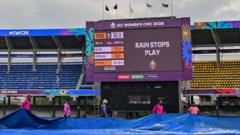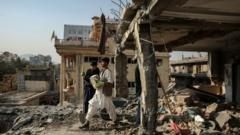Is Colombo's Predictable Weather Ruining the World Cup?

Published: 2025-10-19 12:00:18 | Category: sport
Rain has significantly disrupted the ongoing World Cup matches in Colombo, leading to frustration among players and fans alike. With five out of nine matches affected, four have ended in no result, raising concerns over scheduling during Sri Lanka's monsoon season.
Last updated: 21 October 2023 (BST)
Overview of the Rain Disruption Issue
The 2023 Women's Cricket World Cup has encountered severe weather challenges, particularly in Colombo, Sri Lanka. During October, the region experiences a monsoon season characterised by daily rain, which has complicated the tournament's scheduling. As the excitement builds for a World Cup, the incessant rain has led to a series of disappointing match cancellations, leaving players and fans yearning for action.
- Five of nine matches in Colombo have been impacted by rain.
- Four matches have resulted in no results, leading to frustration from teams and supporters.
- Former players have voiced concerns over scheduling during monsoon season.
- Sri Lanka's R. Premadasa Stadium has been the main venue for group matches.
- Upcoming matches are also predicted to be affected by the weather.
The Impact of Monsoon Season on the Tournament
October is known for its heavy rainfall in Sri Lanka, with estimates ranging from 300 to 370mm for the month. This has been a critical factor affecting the World Cup matches held in Colombo. Alex Hartley, a former England spinner, highlighted the predictability of the weather, stating, "It pretty much rains at the same time every single day." Such climatic conditions have led to a series of matches being called off, raising questions about the scheduling of the tournament.
Player Perspectives on the Rain-affected Matches
Players have expressed their deep disappointment over the frequent rain interruptions. Sophie Devine, the captain of New Zealand, voiced her frustration, stating, "You wait four years for a World Cup and to have to suffer through the rain is extremely frustrating." Likewise, Charlotte Edwards, England's coach, has echoed these sentiments, emphasising the desire for teams to play as much cricket as possible during the tournament.
Scheduling Challenges: Could Changes Have Been Made?
Given the historical weather patterns in Sri Lanka during October, there are calls for a reassessment of match timings. Hartley suggested that games should start earlier in the day to mitigate the impact of the afternoon rains. Currently, all matches are scheduled as day-nighters, starting at 10:30 BST, which coincides with the onset of rain. The question remains: could earlier start times have salvaged some of the games?
Current Standings and the Outlook for Remaining Matches
As teams struggle with the rain, the standings in the tournament are being affected. New Zealand and Pakistan have both faced washed-out matches, jeopardising their chances of advancing to the knockout stages. The possibility of further rain affecting upcoming matches between Pakistan and South Africa, as well as Sri Lanka and Pakistan, looms large. With the weather forecast predicting rain, the situation remains grim.
Historical Context: Previous Experiences with Monsoon Seasons
Hartley reminisced about her tour to Sri Lanka a decade ago, noting that every training session was rained out. This history of weather interference adds a layer of complexity to the current tournament. The expectation for better scheduling appears warranted, especially considering the repeated patterns of rain observed during this time of year.
Consequences for Teams and Their Performances
The ongoing rain disruptions have serious implications for teams like Pakistan, who are currently at the bottom of the standings and facing elimination. Their recent matches, including one against England, showcased their potential to win, but inclement weather thwarted their efforts. The risk of not qualifying for the knockout stages heightens the stakes for these teams, intensifying the disappointment from match cancellations.
The Role of the ICC and Future Considerations
The International Cricket Council (ICC) has been approached for comments regarding the scheduling and rain disruptions. As the governing body, it is crucial for the ICC to learn from this experience and consider alternatives for future tournaments held in similar climates. Adapting match schedules could be vital to ensuring a more successful and uninterrupted tournament experience.
Understanding the Long-term Effects of Weather on Sports
Weather disruptions are not unique to cricket; other sports also face challenges during adverse conditions. The impact of environmental factors on match schedules raises questions about how sports governing bodies can better prepare for such eventualities. The need for contingency plans and adaptable scheduling is becoming increasingly evident in the realm of sports.
Conclusion: What Lies Ahead for the World Cup?
As the World Cup progresses, the persistent rain in Colombo highlights the challenges faced by players and fans alike. The hope for more cricket remains, but with the forecast indicating further rain, the future of upcoming matches remains uncertain. The lessons learned from this tournament may prompt a reevaluation of scheduling practices in future World Cups, particularly in regions prone to heavy rainfall during specific months.
As we navigate through this challenging tournament, the question remains—how can sports organisations adapt to ensure that players and fans receive the best experience possible, regardless of weather conditions? #CricketWorldCup #RainDelay #SportsScheduling
FAQs
Why have so many matches in Colombo been cancelled?
Many matches in Colombo have been cancelled due to rain, which is typical of the monsoon season in October, affecting visibility and playing conditions.
What are the implications for teams affected by rain?
Teams affected by rain face potential elimination from the tournament, as matches that end in no result do not earn them points needed for qualification.
Could the match schedule be adjusted to avoid rain disruptions?
There are calls for matches to start earlier in the day to avoid afternoon rain, which could improve the chances of completing games.
What is the weather forecast for the upcoming matches?
The weather forecast for the upcoming matches in Colombo indicates ongoing rain, further complicating the tournament schedule.
What lessons can be learned from this World Cup regarding scheduling?
This World Cup highlights the need for sports organisations to consider weather patterns and adapt match schedules accordingly to avoid disruptions.



